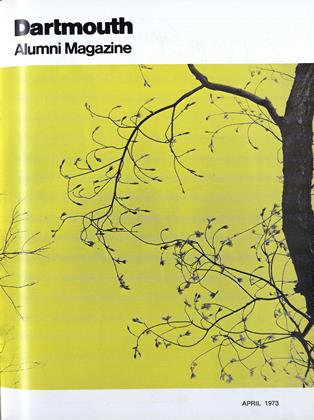You can usually paint a statistical picture that shows the situation to advantage, so that's what we'll do with the Dartmouth sports scene through the fall and winter seasons.
As the spring campaign begins, ten varsity teams that toiled through the fall and winter seasons have compiled a composite record of 73 wins, 61 losses, and four ties. Eight of ten teams have produced winning records. While the overall record is positive, the results against Ivy League opposition haven't been that good - 24-30-2.
At the same time, eight freshman-jayvee teams have produced a record for the two seasons of 64-19-1, which isn't bad at all - provided these young men will continue their pace to the varsity level in the next year or so. The frosh-jayvee effort vs. Ivy foes is 18-7.
That's the complete picture. Now, let's break down the winter that seemed to fly by as fast as the windblown snow on an early January morn. While six of seven teams finished on the plus side, there were some great expectations that didn't come to pass.
Hockey finished a winner but it appeared that Grant Standbrook's team was destined for much more. Considering that two of the Green's wins were against Cornell and Boston College, the teams that represented the East in the NCAA tournament, it's fair to say that the ability was there - but not consistently.
"It was a funny season," said Stand-brook. "We were going great and then went sour. When the defense played well, we couldn't score. When we got some goals, we became careless on defense."
It seems unfair to grouse about a winning record - albeit 12-11-1. Standbrook has produced a winner for the past two seasons after six years on the minus side of the ledger. This seemed to be the year when things would not just turn up but turn up big. But they didn't.
There was talk about making the ECAC playoffs, maybe even ranking among the top four teams in the playoffs. But then, along came that guy named Mr. Incon-sistency.
Against the top seven teams in the East, Dartmouth was 5-6-1 - not bad at all. Against the also-rans, the Green was 3-5 and that's what cost them dearly.
What hurt, too, was a bare two wins (over Cornell and Princeton) and a tie (with Harvard) in the final eleven games. The tournament selection committee considers a team's momentum in its evaluation process and Dartmouth certainly had little momentum in the stretch.
After beating Cornell in a 3-2 thriller on February 3, Dartmouth didn't taste victory again until Princeton came to Davis Rink on March 3. That was the final night of the season and Fred Riggall, the scoring leader and steadiest performer on the attack from Winnipeg, Man., went out in fine fashion. He had three goals and a pair of assists that more than justified his selection as the Martha Phelan Award winner as Dartmouth's most valuable player.
It was the finale of a fine career for Riggall who had 56 goals during three seasons. It was a performance aided by center Bill Berry, another senior from Edmonton, monton, Alb., socred twice and had three assists on Riggall's line. Riggall closed the season with 41 points, Berry 38
But before the fine finish there were long nights against Penn, Northeastern, Brown and New Hampshire. All were on the road and at each turn the Green came up dry.
Overall, though, it was a team that played well against the best and there's merit in that. It was a performance that prompted Paul Dixon, the captain-elect and standout defenseman from Aurora. Ont., to say, "When you beat the good teams it makes losing to the mediocre teams that much harder to take. I don't intend to let that happen next year."
The arriving elements from the 17-1 freshman team should add some punch to Dixon's words.
Senior Robin Derry (31), shown driving inthe 83-69 win over Yale, has been ahardworking mainstay in basketball forthree seasons. He led in rebounding thisyear and also was a top scorer.
 View Full Issue
View Full Issue
More From This Issue
-
 Feature
FeatureMedical Care via Television
April 1973 By BLISS KIRBY THORNE '38 -
 Feature
FeatureGuatemalan Cane Raiser
April 1973 By M.B.R. -
 Feature
FeatureArt Carpenter
April 1973 -
 Feature
FeatureHanover Has A Mardi Gras
April 1973 -
 Article
ArticleFaculty
April 1973 By ROBERT B. GRAHAM '40 -
 Article
ArticleThe Undergraduate Chair
April 1973 By DREW NEWMAN '74







